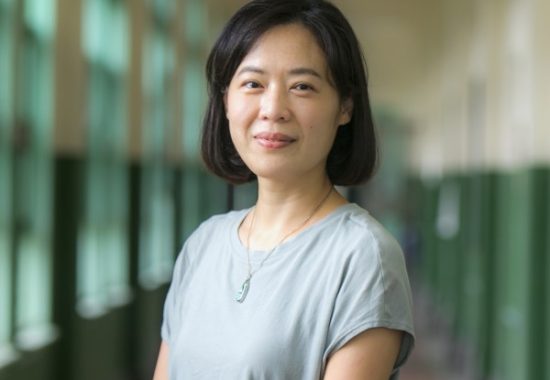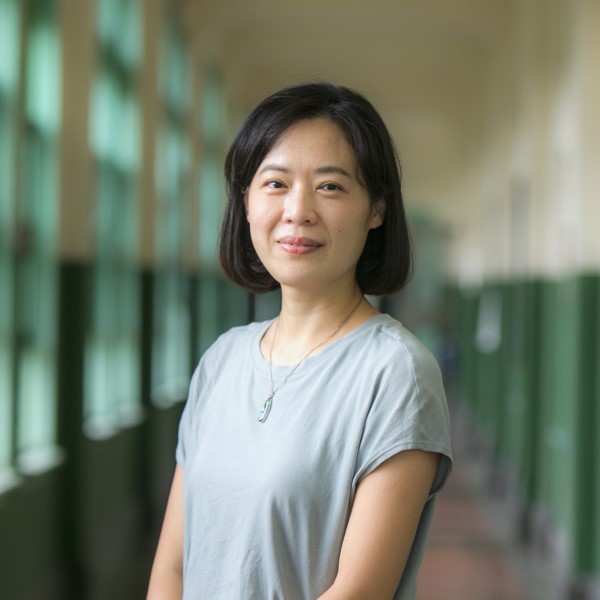Over the years, Moss Rehabilitation Research Institute (MRRI) scientists have provided outstanding mentorship and training to postdoctoral fellows from diverse academic, cultural, and geographic backgrounds. Chia-Lin (Charlene) Lee, PhD, worked at MRRI from 2010 to 2012 in the Cognition and Action Laboratory directed by Laurel Buxbaum, PsyD. In this interview, Charlene discusses her research and her experiences at MRRI.
Question List
- Can you tell us more about your current position and what you are doing now?
I am an associate professor at National Taiwan University (NTU). My main appointment is with the Graduate Institute of Linguistics, and I also have joint appointments with the Department of Psychology and Graduate Institute of Brain and Mind Sciences, and I am a member of the NTU Neurobiology and Cognitive Neuroscience Center. My work mainly involves teaching, advising graduate students, and doing research. Other than that, I also help review papers for journals and recently took the associative editor position for Psychophysiology.
- What are your research interests?
My research interests lie primarily in the area of language processing. Recent work in our lab focuses on the collaborative nature of the two hemispheres of the brain during language processing. For example, what is the role of the right hemisphere in acquiring syntactic regularities and what support can the right hemisphere provide when the dominant system in the left hemisphere deteriorates with age? We are also interested in understanding the predictive processing in the brain. For example, what kind of linguistic information do we anticipate prior to the actual perception of the inputs? What modulates our abilities to do so? What do predictions formed during language comprehension have in common with predictions formed during perception, actions, or other cognitive tasks?
- Can you describe the impacts or potential impacts of your research?
Language is an amazing manifestation of human intelligence. Understanding how a complex system like language is deciphered in the brain brings us closer to the core of the human mind and provides potential help for rehabilitation or intervention. For example, our recent work showed that, although the right hemisphere is usually given little attention in the literature when it comes to syntactic processing, our data suggest that it has some morphosyntactic capacity (processing for both morphological change and syntactic agreement) that is similar to what the left hemisphere has. In addition, the right hemisphere is engaged to a greater degree during syntactic processing in healthy older adults. We also discovered that the right hemisphere can provide important contribution in the initial learning stage of syntactic regularities in healthy young adults.
- What first attracted you to science?
I was interested in biology and mathematics as a kid. Growing up I become fascinated by how humans are capable of processing complex symbolic systems like language seemingly effortlessly. Language studies were categorized as humanities in the education system I was in. It was not until my senior year that I realized that what I was interested in could be studied in more scientific ways in linguistics and psychology.
- Why did you choose to work as a postdoctoral fellow at MRRI?
I have always been interested in how language interconnects with other sensory-motor systems. At that time, Dr. Buxbaum had a research line that focused on embodied cognition and how different types of actions may differentially constitute meaning representations. I was very drawn to this hypothesis and thought that it was a great opportunity to learn how to systematically examine research questions like this. I was fortunate to have the opportunity to work as a postdoctoral fellow with Dr. Buxbaum at MRRI to learn more on this topic.
- What was it like working in the Cognition and Action Laboratory at MRRI?
When I was in the lab, there were also other post-docs and full-time research assistants. Everyone was very friendly and professional. It was a very collegial lab. I still remember the help Dr. Solene Kalenine gave me when I first got to the lab, and those afternoons when people grabbed a cup of coffee and drew new ideas on the whiteboard!
Dr. Buxbaum is a very energetic leader, but she also kept things at a very reasonable pace. She gave us room to sharpen our skills and catch up on the literature that we may not be as familiar with as we wanted to be, and provided the help and resources that we needed. At a project meeting, her suggestions were always insightful and nudged the project in the right direction. J She is also very fun to be with. Her passions for science and music are very inspiring to me.
- Is there something you learned at MRRI that has helped you in your current endeavors?
The research training I got from MRRI was very solid and had a great influence on me. Other than that, working at MRRI gave me many opportunities to work with people from various disciplines and to observe how people from different disciplines communicate and collaborate. These kinds of multidisciplinary experiences are very helpful in my current position.
- What is one of your favorite memories from your time working at MRRI?
When I think about my time working at MRRI, the first image that pops into my mind is the regular lab meetings we had in the common area. Dr. Buxbaum’s lab had a weekly lab meeting with collaborating labs, including Dr. Dan Mirman’s and Dr. Steven Jax’s labs. Those meetings were always light-hearted and full of friendly comments and discussions. We were very productive, but things were done in a very collegial environment. Maybe that’s why I always remember it as a cozy afternoon scene with autumn sunlight.
I also like that our offices were among the areas where patients regularly came in for therapy sessions or social group activities. This and our clinical seminars that Dr. Kalenine mentioned in her recent interview really helped to flesh out my research experience as they helped me to see how different endeavors can all work together toward a common goal.
- Can you tell us more about your long-term career plans or goals?
In my current position, I spend a lot of time working with ‘young students’ (master’s students or undergraduate students). I hope, with time, our young students will become mature and independent scientists. I very much look forward to working with them as peers and colleagues. Then it can be my turn to take a break to refuel my research energy! Eventually, I hope we can build a language science team at National Taiwan University and attract more talented local and international researchers to join us.
- What are some of your personal interests or hobbies?
I like watching movies and reading novels. I also like to bring my kids outside to enjoy nature. Taiwan is a mountainous island. There are many easy and moderate hiking trails available, and it is also quite convenient to go to a beach.



11 comment on “Catching Up with Former MRRI Postdoc Charlene Lee, PhD”